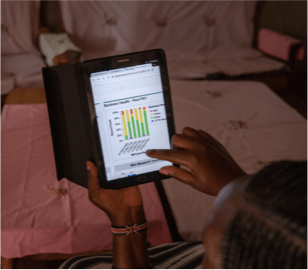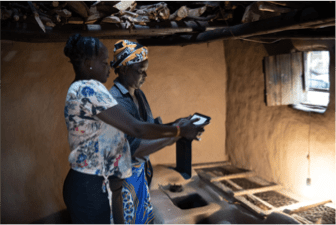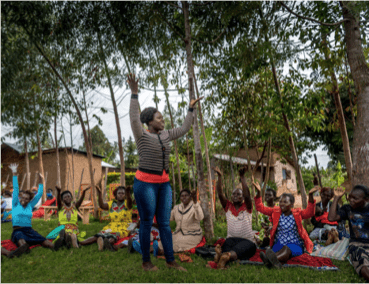
Search
The poverty graduation approach has delivered encouraging results for poverty alleviation (Research: Innovations for Poverty Action) and Village Enterprise has been a proponent and implementer of this poverty reduction process over the past 30 years. Through its work with women entrepreneurs living in extreme poverty, Village Enterprise learned that both poverty alleviation and women’s empowerment can come from helping program participants start businesses – with seed capital in the form of cash transfers, training and ongoing mentoring.
“According to our independent randomized controlled trial results, our group-based poverty Graduation model is particularly impactful for our women business owners who make up over 75% of our program participants,” wrote Village Enterprise President and CEO Dianne Calvi in 2019. “In addition to benefiting from significant increases in income, nutrition and savings, women who graduated from our program reported increased status in their communities and subjective well-being including improved mental health and overall sense of happiness.” (Village Enterprise Impact Report)
It was with that in mind that Zita Akwero, Village Enterprise’s Uganda Regional Manager, highlighted (during a recent webinar to recognize International Women’s Day) how TaroWorks’ offline mobile field service app, Salesforce.com and the data they collect and analyze are helping empower both the women hired by Village Enterprise to act as business mentors and women in the poverty alleviation program who the mentors train and advise.
Zita exemplifies how women can advance by acquiring technology and data skills, having started out as a business mentor herself who learned how to successfully use Salesforce dashboards to plan her daily tasks. Now, she’s managing teams of business mentors for an entire region and is enabling them to use technology and data.

Like many of the organizations we work with, Village Enterprise began managing its field operations using pen and paper, then spreadsheets and finally open source software.
Zita pointed out that as Village Enterprise’s poverty graduation program grew, so did its need for mobile and cloud technology that could help gather larger amounts of field data accurately through avoiding data entry by hand. They were also looking for a database that could analyze the metrics in real time and a two-way flow of information between office staff and the remote field team for program evaluation and business decision-making.
Using TaroWorks and Salesforce to collect and analyze data that helped target who among potential poverty graduation program participants would be the best candidate for assistance, was an important benefit as was the ability to capture the entrepreneurs’ photos, signatures and geolocations, Zita said.
Central to the graduation model’s success in driving poverty alleviation and women’s empowerment is the role played by women business mentors hired by Village Enterprise to work with program participants. These team members help identify the potential entrepreneurs in their communities, set up savings groups and train them on topics like group dynamics, financial literacy and microenterprise development.
The business mentors are equipped with a mobile device and the TaroWorks app, which they use to log results and updates as they travel to the communities, even if operating in remote locations without connectivity. Once within range of an internet or mobile device data signal, the information is uploaded to the Salesforce CRM and presented on data visualization dashboards in near real time, which measure a range of program metrics including:

Using mobile technology and data helps business mentors give “informed advice” to female entrepreneurs in the graduation program since they now have more visibility into how each facet of the program is working and more transparency to help spot problems.
“We always monitor the progress of these businesses and…we have different indicators and different ratings that we give to different businesses,” Zita said during the webinar. “If a business has been rated ‘red’ (rather than yellow or green on the data dashboards), a business mentor will be in position to tell the story behind the red rating…and then we’ll go and share with the entrepreneurs and this will trickle (down) in improvements in the areas where they are not doing well.”
Becoming comfortable using technology platforms and data for their day-to-day activities has helped women business mentors build a powerful skill set. Zita said job application requirements in Sub-Saharan Africa are increasingly technology-dependent. The mobile ecosystem is supporting 3.8 million jobs and growing, according to a 2020 report from GSMA, which represents mobile operators. The technology skills gained at Village Enterprise will make business mentors more competitive in the job market.
As business mentors become proficient in the use of technology and data, Zita said it encourages the program participants to embrace similar technology.
“A female business mentor can actually appreciate the challenges and the pain that (her) fellow women…out there in the community go through so you find that our female business mentors are actually a great source of inspiration to our entrepreneurs,” Zita said. “When it comes to technology, the moment they see…our female business mentors using technology, using the tablets in the field, they get inspired…they also want to become just like these business mentors.”

Among the other ways technology and data have helped the entrepreneurs-in-training move closer to poverty alleviation and women’s empowerment are:
“… were not actually using smartphones…they would just think that it is impossible for them since they have a low level of education. They would just feel that it is something very complex…but when they started seeing our business mentors use some of these digital tools…they felt that yes it is something that they can actually do.”
When a growing number of the program participants began using smartphones, Village Enterprise switched from disbursing business grants to the entrepreneurs in cash, to delivering the funds via smartphones using mobile money. Zita estimated that digitizing the process reduced the time it takes to distribute the funds in parts of Uganda and Kenya from 2 weeks to 2 days.
When COVID19 restricted travel and required social distancing, business mentors were able to stay connected with some of the entrepreneurs by switching to mentoring sessions over mobile phones using TaroWorks’ click to call functionality.
This resourcefulness and determination to keep the program going during the pandemic is a hallmark of the women who succeed in Village Enterprises’ poverty graduation program. Using technology and data is bolstering efforts to achieve both poverty alleviation and women’s empowerment.

Book a demo today to learn more about TaroWorks and how it can help your organization maximize it’s impact.
View Webinar Video
POST TOPICS
Sign up to receive emails with TaroWorks news, industry trends and best practices.
TaroWorks, a Grameen Foundation company.
Site by V+V